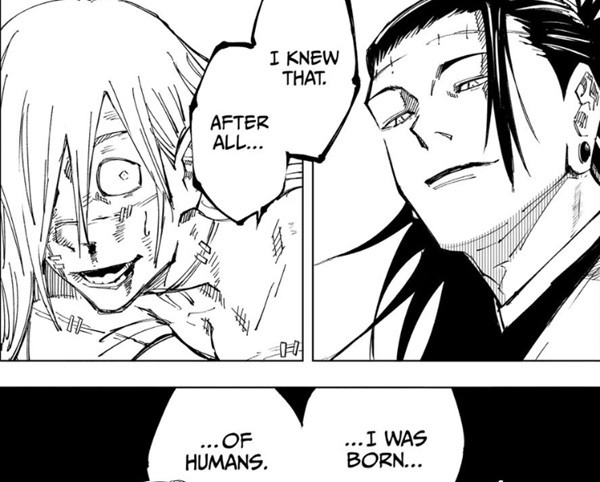For many fans of Jujutsu Kaisen, Mahito’s final moments were a complex mix of satisfaction and lingering questions. While his defeat at the hands of Yuji Itadori was a long-awaited climax, the moments leading up to his absorption by Kenjaku (disguised as Geto) raise a significant question: why did Mahito suddenly attack Geto without any apparent provocation?
After a grueling battle and defeat by Itadori, aided by Aoi Todo, Mahito was desperately seeking escape. Just as he seemed cornered, Geto/Kenjaku appeared, offering a lifeline. However, this salvation quickly turned into betrayal as Kenjaku revealed his true intentions, absorbing Mahito and making it clear that cursed spirits were merely pawns in his grand scheme.
In the moments before this absorption, Mahito launched a surprise attack on Kenjaku. Though ultimately unsuccessful, this act begs the question: what drove Mahito to attack his supposed ally? Was it a premonition of betrayal? Was it a desperate attempt to survive? Let’s delve into the nuances of this scene and explore the reasons behind Mahito’s unexpected assault.
Seeds of Suspicion: Hints from Chapter 93
To understand Mahito’s attack, we need to rewind to earlier instances that hinted at his growing unease towards Kenjaku. One crucial moment occurs in chapter 93 during a discussion between Mahito and Jogo about whether to eliminate Yuji Itadori. In the midst of their argument, Mahito directly questions Geto/Kenjaku about joining their fight.
Geto declines, stating his need to remain behind and oversee the Prison Realm. Crucially, this scene is punctuated by a panel showcasing Mahito casting a suspicious glance at Geto.
Alt text: Mahito, a cursed spirit in Jujutsu Kaisen, eyes Geto with suspicion during a conversation, hinting at his growing distrust.
While easily overlooked initially, this moment subtly plants the seed of doubt regarding Geto’s true agenda in Mahito’s mind. In retrospect, we understand Kenjaku’s deceptive motives. His stated reason for staying behind was a fabrication. His actual goal was to allow Mahito to grow stronger during the Shibuya Incident, ultimately making him ripe for absorption to further Kenjaku’s own intricate plans.
Mahito, as a cursed spirit embodying the manipulation of souls, possesses an innate understanding of the human soul and its emanations. He explicitly states to Junpei Yoshino that emotions originate from the soul. Therefore, it’s plausible that Mahito, with his heightened sensitivity to souls, could perceive the dishonesty and ulterior motives emanating from Kenjaku even in chapter 93.
The Confession: “…I was born of humans” in Chapter 134
Further solidifying the theory of Mahito’s awareness is his dialogue in chapter 134, during his absorption by Kenjaku. As Kenjaku is consuming him, Mahito utters the poignant words, “I knew that, after all…I was born…of humans.”
This statement is rich with meaning and provides a crucial insight into Mahito’s understanding of his own existence and the nature of humanity. Cursed spirits are manifestations of human fears and negative emotions. Jogo embodies humanity’s fear of volcanoes, Hanami represents the fear of forests, and Mahito himself is born from the collective hatred and malice humans harbor towards each other.
Chapter 20 of Jujutsu Kaisen explicitly reveals Mahito’s origin as a cursed spirit born from human hatred. This origin grants him a unique perspective on human nature, particularly its darker aspects and capacity for evil. It’s reasonable to assume that Mahito, deeply rooted in human negativity, could readily anticipate betrayal and self-serving actions, even from those he considered allies.
Therefore, Mahito’s statement to Kenjaku is not a lament but a confirmation of his understanding. He recognizes Kenjaku’s betrayal as an inherently human act, consistent with the negativity from which he was born. Coupled with his earlier suspicion in chapter 93, this dialogue strongly suggests that Mahito was not naive to Kenjaku’s intentions and foresaw his own demise as a tool in Kenjaku’s larger scheme.
Predator-Prey Symbolism and Mahito’s Perception
Adding another layer to this interpretation is a symbolic panel from chapter 133. In this panel, mangaka Gege Akutami depicts Mahito as a rabbit and Yuji Itadori as a wolf, highlighting the predator-prey dynamic in their conflict. However, Akutami also portrays Geto/Kenjaku as a black wolf in the same panel.
Alt text: Symbolic panel from Jujutsu Kaisen chapter 133 portraying Mahito as a vulnerable rabbit and Kenjaku as a predatory black wolf, foreshadowing Kenjaku’s betrayal.
While this could be interpreted as simple predator-prey symbolism within the narrative, considering it from Mahito’s perspective offers a deeper meaning. If we analyze this panel through Mahito’s eyes, it suggests he perceived Kenjaku not as a savior but as another predator, lurking in the shadows, ready to exploit him.
This symbolic representation further reinforces the idea that Mahito’s attack on Geto was not a random act of aggression but a calculated, albeit desperate, attempt to resist his inevitable fate. He likely understood that he was being played and chose to fight back, however futilely, rather than be passively consumed.
In conclusion, Mahito’s attack on Geto/Kenjaku was not born out of confusion or misunderstanding. Instead, it stemmed from a growing suspicion, nurtured by subtle cues and Mahito’s inherent understanding of human nature and betrayal. His poignant final words and the symbolic representation in chapter 133 paint a picture of a cursed spirit who, despite his villainous nature, possessed a keen awareness of his own manipulation and chose to confront his betrayer in his final moments. This act, while ultimately unsuccessful, underscores the complex and often tragic relationships within the world of Jujutsu Kaisen.

